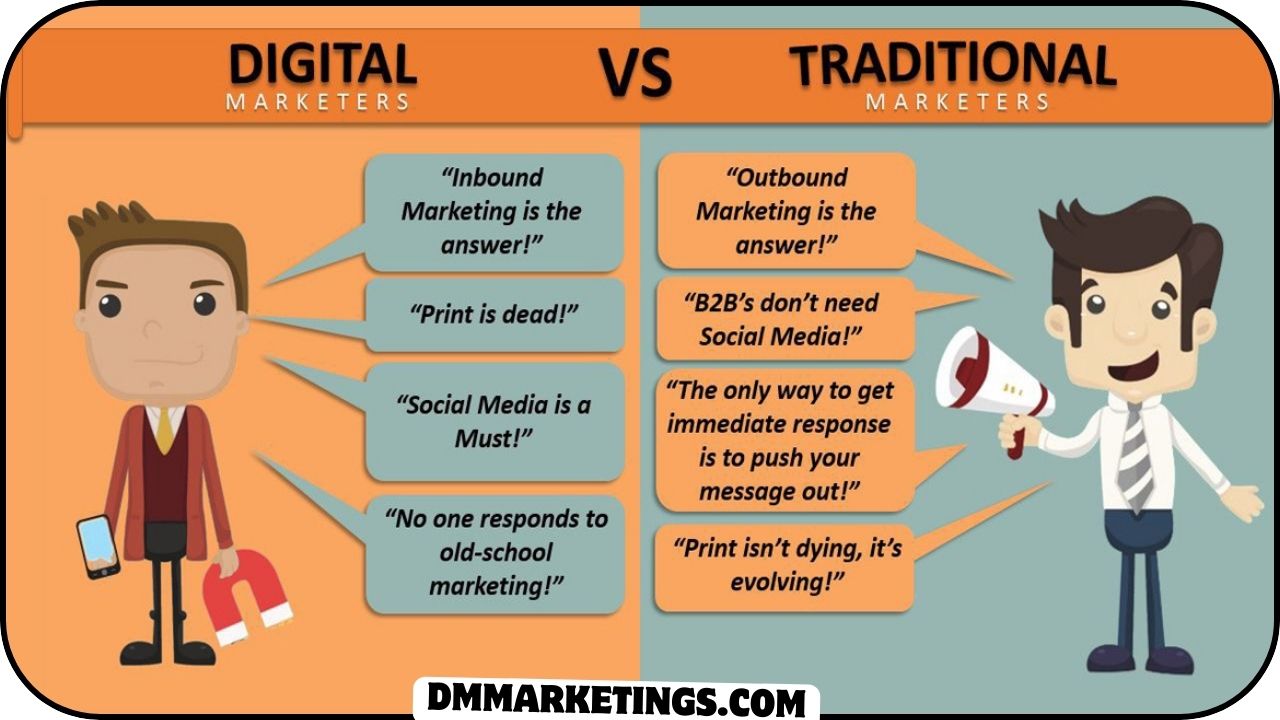difference between marketing and digital marketing
Marketing has been the cornerstone of business promotion for decades. However, with the advent of the digital age, a new player has emerged – Digital Marketing. In this article, we’ll delve into the disparities between traditional marketing and its modern counterpart, digital marketing.
1. Introduction
Definition of Marketing
Marketing is a broad term encompassing all activities a company undertakes to promote and sell its products or services. It involves understanding customer needs, creating products that meet those needs, and promoting them effectively.
Definition of Digital Marketing
Digital marketing is an evolution of traditional marketing, utilizing digital channels such as search engines, social media, email, and websites to connect with current and prospective customers.
2. Traditional Marketing vs. Digital Marketing
Overview of Traditional Marketing
Traditional marketing relies on conventional channels like print ads, billboards, TV, radio, and direct mail. It’s the marketing we’ve known for years.
Overview of Digital Marketing
Digital marketing, on the other hand, leverages the vast digital landscape, reaching customers through online platforms, social media, search engines, and email.
Key Differences
While both aim to reach and influence audiences, they differ significantly in approach, effectiveness, and the scope of their impact.
3. Scope and Reach
Geographic Limitations in Traditional Marketing
Traditional marketing is often confined to specific regions, limiting its reach to local or national audiences.
Global Reach in Digital Marketing
Digital marketing breaks geographical barriers, enabling businesses to connect with a global audience instantly.
4. Cost-effectiveness
Comparative Costs in Traditional Marketing
Traditional marketing campaigns, especially on TV or in print, can be costly, making it challenging for small businesses.
Cost Efficiency in Digital Marketing
Digital marketing offers cost-effective alternatives, allowing businesses of all sizes to promote themselves efficiently.
5. Targeting and Personalization
Broad Target Audience in Traditional Marketing
Traditional marketing tends to target a broader audience, hoping to reach potential customers within that demographic.
Targeted and Personalized Approach in Digital Marketing
Digital marketing enables precise targeting, allowing businesses to tailor messages for specific demographics, increasing relevance and engagement.
6. Measurability and Analytics
Limited Analytics in Traditional Marketing
Traditional marketing often lacks comprehensive analytics, making it challenging to measure the success of a campaign accurately.
Advanced Analytics in Digital Marketing
Digital marketing provides robust analytics tools, offering insights into campaign performance, user behavior, and ROI.
7. Speed and Real-time Interaction
Time Constraints in Traditional Marketing
Traditional marketing strategies take time to produce results, with limited opportunities for real-time interaction.
Real-time Interaction in Digital Marketing
Digital marketing facilitates real-time interactions with customers, fostering engagement and responsiveness.
8. Adaptability and Flexibility
Rigidity in Traditional Marketing Strategies
Traditional marketing strategies can be rigid, making it difficult to adapt quickly to changing market trends.
Adaptive Nature of Digital Marketing
Digital marketing allows for flexibility, enabling businesses to adapt swiftly to market changes and consumer behavior.
9. Customer Engagement and Interaction
One-way Communication in Traditional Marketing
Traditional marketing typically involves one-way communication from the business to the audience.
Two-way Communication in Digital Marketing
Digital marketing encourages two-way communication, fostering engagement and building stronger relationships with customers.
10. Brand Building and Online Presence
Brand Building in Traditional Marketing
Traditional marketing plays a vital role in building brand awareness through consistent messaging and imagery.
Building Online Presence in Digital Marketing
Digital marketing focuses on creating and maintaining a strong online presence, crucial in today’s digital landscape.
11. Social Media Impact
Limited Social Media Presence in Traditional Marketing
Traditional marketing often underutilizes social media, missing out on a vast audience present on these platforms.
Social Media Dominance in Digital Marketing
Digital marketing harnesses the power of social media, utilizing it for brand promotion, customer engagement, and lead generation.
12. SEO and Search Engine Visibility
Ignoring SEO in Traditional Marketing
Traditional marketing may overlook the importance of SEO, impacting the visibility of the business in online searches.
Prioritizing SEO in Digital Marketing
Digital marketing prioritizes SEO strategies, ensuring businesses rank high in search engine results, enhancing visibility.
13. Case Studies
Successful Traditional Marketing Campaigns
Examining successful traditional marketing campaigns showcases the impact of conventional strategies.
Successful Digital Marketing Campaigns
Digital marketing success stories highlight the effectiveness of modern online promotional methods.
14. Challenges and Opportunities
Challenges in Traditional Marketing
Traditional marketing faces challenges in adapting to the evolving digital landscape and changing consumer preferences.
Opportunities in Digital Marketing
Digital marketing presents numerous opportunities for businesses to thrive in the digital age, connecting with audiences in innovative ways.
15. Conclusion
In conclusion, while traditional marketing methods have their merits, the digital era has ushered in a new era of marketing – digital marketing. The latter’s adaptability, cost-effectiveness, and global reach make it a powerful tool for businesses aiming to thrive in the modern marketplace.
Frequently Asked Questions
- Is digital marketing more expensive than traditional marketing?
- Digital marketing can be more cost-effective, especially for small businesses, compared to traditional marketing channels.
- How does digital marketing impact brand building?
- Digital marketing focuses on building a strong online presence and engaging with audiences through various digital channels, contributing significantly to brand building.
- Can traditional marketing strategies be integrated with digital marketing?
- Yes, businesses often use an integrated approach, combining traditional and digital marketing strategies for a comprehensive marketing plan.
- What role does SEO play in digital marketing?
- SEO is crucial in digital marketing, ensuring better visibility on search engines and attracting organic traffic to a website.
- Is social media essential for digital marketing success?
- Social media is a powerful tool in digital marketing, offering opportunities for brand promotion, customer engagement, and lead generation.
